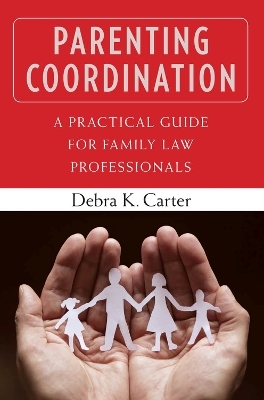
Parenting Coordination
Springer Publishing Co Inc (Verlag)
978-0-8261-0647-6 (ISBN)
Debra Carter, PhD is the co-founder and clinical director of the National Cooperative Parenting Center in Bradenton, FL. She also owns and operates a clinical and forensic psychology practice at the Carter Psychology Center, where she offers psychotherapy, evaluation, mediation, and parenting coordination services. She has -authored two books on parenting coordination and several scholarly articles highlighting her research on parenting coordination.
Introduction
A. Divorce Resolution in U.S.
B. Evolution of Parenting Coordination
C. Benefits for Parents, Children, Courts and Society
Chapter One: Parenting Coordination: An Integrated Model
A. A Brief History
B. Therapeutic Skills
C. Evaluator Skills
D. Mediator Skills
E. Educator Skills
F. Consultant Skills
G. Integration of Hybrid Role
Chapter Two: Parenting Coordination Procedures
A. When Does a PC Become Involved with a Family?
B. How Does a PC Become Involved with a Family?
C. Direction & Authority - The Court Order
D. Contract with Parties
E. Data Gathering
F. Appointments
G. Communication
H. Documentation
Chapter Three: Organizing the PC Work
A. Screening Procedures
B. Overt Sources of Conflict
C. Covert Sources of Conflict
D. Identifying Parent Interaction Style
E. Building a Support Team for the Family
Chapter Four: Conflict Analysis, Identification, and Management (AIM)
A. History of Conflict
B. Analysis of Conflict
C. Identifying Types of Conflict
D. Intractable Conflict and Underlying Causes
E. Conflict Management Styles
Chapter Five: PC Strategies
A. Formulating an Effective Approach
B. Focus on the Goal
C. Creating an Infrastructure of Empowerment
D. Building Scaffolding for Healthy Children & Families
Chapter Six: PC Techniques
A. Interventions in PC
B. Changing the Frame of the Conflict
C. Options for Conflict Management
D. When Negotiation and Compromise are not the Solution
Chapter Seven: The Parenting Plan (PP)
A. Definition
B. What should it include?
C. Anticipating and Preparing for change
a. Developmental Needs of Children
b. Evolving Family Definition
c. Unanticipated Exigencies
d. PC's Role in Modification of the PP
Chapter Eight: Special Topics
A. Parental Alienation, Estrangement, and Disengagement
B. Attachment Issues
C. Mentally Ill Parents
D. Addicted Parents
E. Domestic Violence
F. Abusive Parents
Chapter Nine: Troubleshooting
A. When PC is No Longer Effective or Appropriate
B. Protection for All
C. Monitoring Professional Boundaries and Well-Being
D. Ethical Dilemmas
Appendices
Sample Orders
Sample Parenting Plans
Training Guidelines
Standards of Practice
Ethical Guidelines
Tables
Sample PC Statues
PC Programs in the U.S. and other countries
Resources
Bibliography
Useful Websites
| Verlagsort | New York |
|---|---|
| Sprache | englisch |
| Gewicht | 455 g |
| Themenwelt | Geisteswissenschaften ► Psychologie ► Familien- / Systemische Therapie |
| Recht / Steuern ► EU / Internationales Recht | |
| Recht / Steuern ► Privatrecht / Bürgerliches Recht ► Familienrecht | |
| Sozialwissenschaften ► Pädagogik ► Sozialpädagogik | |
| Sozialwissenschaften ► Soziologie | |
| ISBN-10 | 0-8261-0647-1 / 0826106471 |
| ISBN-13 | 978-0-8261-0647-6 / 9780826106476 |
| Zustand | Neuware |
| Haben Sie eine Frage zum Produkt? |
aus dem Bereich


